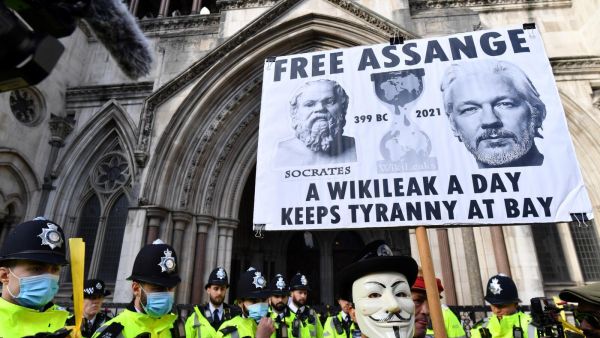The United States is appealing a ruling by a British judge not to extradite Julian Assange, the Australian journalist and founder of WikiLeaks. In January, District Judge Vanessa Baraitser found that US prison conditions would be too oppressive, and that Assange would be likely to take his own life.
In response, the United States has taken the case to the High Court to contest her findings about Assange and his health.
In addition, the United States has offered diplomatic assurances, saying that it won't put Assange in oppressive prison conditions, which doctors have said would lead to suicide.
Julian Assange is still in prison for publishing the truth.
— Is Julian Assange free yet? (@AssangeFreeYet) November 4, 2021
So what exactly are these diplomatic assurances that the United States has offered, and can they actually be trusted?
Why has his health become the focus of discussion despite scores of legal experts, academics, journalists and historians having all warned that this indictment currently poses the biggest threat to press freedoms?
The Health of Assange
The High Court appeal took place on October 27 and 28 of 2021 lasting just two days. The United States is appealing the decision by judge Baraitser's not to extradite Julian Assange on five grounds. These five grounds can be summed up in two categories.
Number one, Assange's health and number two, the diplomatic assurances.
As we've mentioned before Judge Baraitser blocked the extradition of Assange to the US, mainly on health grounds.
The US response
The US lawyers argue that she erred in her judgment, that she didn't apply the test correctly, that Assange doesn't meet the criteria for his extradition to be oppressive.
They accuse him of essentially being a malingerer, someone who's pretending to be sick.
Professor Michael Kopelman is the lead medical expert for the defense. Koppelman's testimony is very important because the judge relied heavily on it to block the extradition.
She said that she preferred his testimony because his notes were more detailed than the other doctors.
Koppelman also spent the most time with Assange. So because his testimony is so crucial for the defense, the United States lawyers have tried desperately to discredit both the report and Koppelman.
In his first psychiatric report, Koppelman did not disclose the relationship between Julian Assange and Stella Morris, or that they had had two children in the Ecuadorian Embassy.
Although this point has nothing to do with medicine or psychiatry, the United States is exploiting it to accuse Koppelman of misleading the court. They say that his medical evidence should be given little or no weight.
Assange's lawyer has replied that Koppelman did not conceal anything from the court. He only kept the relationship secret because he was concerned for the privacy and safety of Miss Morris and her children. This happened right around the time when we were finding out about Assange being spied on in the Ecuadorian embassy, among other things.
In her ruling, Judge Baraitser did say that she found this behavior from Koppelman misleading and inappropriate, but an understandable human response to Miss Morris' predicament.
The lead prosecutor for the United States, James Lewis, accuses Assange of being a malingerer, trying to avoid extradition. In the high court, Lewis said that, "if he's clever enough, he can get around extradition. It then becomes a trump card, which cannot be dealt with by the requesting state, even if the situation there is 100 times better than in England”.
The prosecution argues that Assange did not meet the criteria under the Turner test, which tests the inability to resist the impulse to commit suicide. Only that could block extradition.
Assange's lawyers respond that Professor Koppelman did find this to be the case. Koppelman says that Assange would not be able to resist the impulse to commit suicide if extradited; he will take his own life.
His attorneys also pointed out that there are people who make plans to take their own lives. That's not impulsive, but is still driven by their mental disorder. And so it's unreasonable, it doesn't make sense to say that Assange is not suicidal just because he's not impulsively suicidal.
The appeal hearing in the High Court consisted of various accusations from the prosecution that the defense's medical experts were lacking in expertise or integrity.
ADX Florence, worse than death
For example, that Koppelman had misled the court, that the medical expert for the defense was wrong in his autism diagnosis, and so forth.
The other main topic discussed in the High Court was that of diplomatic assurances. The United States has said that if Assange is extradited it will not place him in special administrative measures, or Sam's, which are some of the worst prison conditions imaginable.
The US also says that Assange won't be sent to ADX Florence, one of the worst prisons in the country. Robert hood, the former warden at ADX Florence, described it as worse than death.
The US also claims that Assange could serve a potential sentence in his home country, Australia. At the High Court hearing Lewis actually argued that Assange can't be that suicidal because he can look forward to going to jail in Australia. As if going to jail in one's home country is something that every journalist dreams of.
Let him crochet
The prosecution claim that they weren't given a fair chance to offer these assurances before and had they done so, the judge would have ruled differently. Lawyers for Assange point out that this isn't true.
They say the United States had many opportunities to offer assurances that Assange won't be placed under SAMs. Instead, the prosecution not only said that SAMs are possible, but that they're okay.
They said that Assange can do crochet and write poetry and self recreate, which essentially means going into an adjacent empty room to spend time by himself.
Maureen Baird used to be the warden of a notorious jail in New York, The Metropolitan Correctional Centre at MCC. She testified at the hearing and described what prison conditions are like in pretrial SAMs.
She said that inmates were in solitary confinement technically for 24 hours a day. There was absolutely no communication by any means with other inmates, and the only form of human interaction they had was when the guards came to inspect their cells or give them food through the slot in the door.
“SAMs are the darkest corner of the U.S. federal prison system, combining the brutality and isolation of maximum security units with additional restrictions that deny individuals almost any connection to the human world. They prohibit prisoners who live under them from contact or communication with all but a handful of approved individuals, and impose a second gag on even those few individuals. The net effect is to shield this form of torture in our prisons from any real public scrutiny.”
Center for Constitutional Rights
Last year at The Old Bailey, anonymous testimony was heard from former employees of UC global the Spanish firm in charge of security at the Ecuadorian Embassy where Assange had been given political asylum.
The employees described how the United States got them to spy on Assange by installing cameras and secret microphones. And there were even discussions about physically hurting or kidnapping the WikiLeaks founder.
And last week for the first time, we saw the Yahoo News story brought up in court.
Published in September, It has 30 US officials admitting that the CIA was discussing plans to potentially assassinate Assange or kidnap him in London. This corroborated what had already been revealed by UC Global employees.
Assange's lawyers pointed out that even former CIA director, Mike Pompeo, confirmed this to be true.
So if the decision to place Assange under SAMs is up to the Attorney General with input from the CIA, of course, they're going to put him in SAMs.
This is the same agency that was discussing maybe killing Assange. It's the same agency whose files he published in the 2017 leaks; there is no doubt that they will put him in SAMs.
His lawyer explained that even if Assange isn't placed in Sams, which he almost certainly will be, despite reassurances to the contrary, he can still be put in other oppressive conditions.
Mark Summers, Assange's lawyer, said you can be entirely confident that in the event of surrender to the USA, Julian Assange will enter into administrative segregation, Ad Seg, and Alexandria for years. He added that Ad Seg is isolation. There is no assurance from the US not to place Assange under Ad Seg.
All the evidence suggests that Ad Seg is aprospect for Mr. Assange. Mr Assange's lawyer, Mark Summers, added that even if ADX Colorado was off the table, Assange would be sent to a communications management unit or CMU, it's a prison within a prison, an experiment in social isolation.
Correspondence is limited to one six page letter a week to one recipient.
And in regards to being sent to Australia, Assange's lawyerrs argue that, first of all, Australia hasn't even accepted or said yes, and even if it did say yes, who says that future politicians would agree?
We have no idea who will be in power in 10 years when this process is actually finished.
This is a process that could take a very long time and Assange would most certainly be in isolation for the duration. That isolation would lead him to take his own life, as doctors confirmed to the court.
Now the United States lawyers said that these assurances are solemn undertakings given up at the highest order, these are not dished out like Smarties. Lewis added that the United States has never broken a diplomatic assurance, ever.
Lawyers for the defense do not believe that to be true. They say these assurances can't be trusted because they're worded in a way that binds the prosecutors, but not the Department of Justice.
So even if Assange is extradited, and placed in Sam's and he complains the Department of Justice can just say, we never promised you that.
Assange's lawyers gave examples of other people who were given false assurances by the US. They were extradited thinking they'd be placed in a medical unit, or hospitalized and then sent instead to ADX.
The United States even has a disclaimer in the assurance, where it practically admits that Assange will be placed understands it says very clearly, Mr. Assange will not be subject to SAMs or imprisonment at ADX unless he does something that would warrant such action, like threatening national security.
This means they certainly will place him under SAMs because the whole case is built on the false premise that Assange and WikiLeaks endangered national security. Assange’s lawyer, Mark Summers, added that even in the event of acquittal in the United States, what Gordon Kromberg could do is summon him before a grand jury, incarcerate him for civil contempt and place him in a special housing unit.
So even if Assange is acquitted, he could still go back to jail. And it's not just a possibility. It's actually quite likely because Kromberg did precisely this to Chelsea Manning when Manning refused to testify against Julian Assange.
The United States even has a disclaimer in the assurance, where it practically admits that Assange will be placed understands it says very clearly, Mr. Assange will not be subject to SAMs or imprisonment at ADX unless he does something that would warrant such action, like threatening national security.
This means they certainly will place him under SAMs because the whole case is built on the false premise that Assange and WikiLeaks endangered national security. Assange’s lawyer, Mark Summers, added that even in the event of acquittal in the United States, what Gordon Kromberg could do is summon him before a grand jury, incarcerate him for civil contempt and place him in a special housing unit.
So even if Assange is acquitted, he could still go back to jail. And it's not just a possibility. It's actually quite likely because Kromberg did precisely this to Chelsea Manning when Manning refused to testify against Julian Assange.
So besides an SHU or CMU, what else could they do?
The other thing we could be concerned about, and Kromberg lays it out very clearly, is that Assange can be put in protective custody because he's a high profile prisoner.
And what that means is they get to do all sorts of things that they did to Chelsea Manning when she was first detained and was awaiting trial.
Not one of the elite journalists who pushed the Steele Dossier have faced any professional consequences and most won’t acknowledge their errors.
— Max Blumenthal (@MaxBlumenthal) November 6, 2021
Meanwhile, Julian Assange - who has never published a single inaccuracy - faces life in solitary confinement for telling the truth.
You remember the international scandal that was sparked by her treatment at the Quantico Marine brig, which has since been shut down and actually does not exist, there are not people detained there anymore.
And so and then, and in that facility, remember, they took her clothing away, they took her underwear away, they made her wear the suicide smock, which I saw displayed during the court martial. I saw her put it on and demonstrate what it was like. It's just like, itchy, uncomfortable thing that like nobody would be comfortable sleeping in, and especially in a prison.
And they did this to her by twisting her words against her and reading into it the worst intentions, it was sarcasm, or she was talking about, you know, like if you're going to do this to me I could take the elastic in my waistband and I could do this with it. And then just, I guess, to be a smart alec, the military person who was overseeing her treatment, decided, well, we need to take this seriously and take all the clothing away.
And when they called roll in the morning she came out of her cell and she's completely naked and everyone else has on what they're wearing in the prison. And everyone the people who are doing security for that prisoner sort of like, why is this inmate not have any clothing on?
She was treated like that, as part of protective custody. The idea that they had to make sure no matter what she survived and made it to her trial, don't think they won't do the same thing to Julian Assange.
They will say that they are putting him in restrictive conditions to protect his own safety in order to prevent him from doing anything to himself.
They will take his mental health, they will use all the worst claims that the defense has made to try and save him and they will turn them against Julian Assange so that he is even more miserable, If you can believe it.
And you may not think how could you be more miserable, they will find a lower low that they can take this while he is in confinement.
Kevin Gosztola, Journalist
Can you maybe walk us through all these various outcomes, all the possibilities of where Assange and his judicial process can go and when we might expect a decision?
...US appeals to the High Court, that's where we are. We're also I think there's another box that has us appeals to the High Court. But that's not the same route anyways, there are three actions that can happen, the court can dismiss it. Well, then what's going to happen is the US will appeal and it'll go before the Supreme Court.
If it accepts these assurances, these diplomatic assurances that we do not find to be of any value, then it'll potentially go back down to the district court level. As you basically go back to go and you have a hearing before, I hope it would be a different judge and not Vanessa Baraitser, but I suppose things have been kind of bizarre already so maybe she gets to have another crack at it.
And, but again, I would think that it would be a different judge, It should be, and they would have a hearing on these assurances and discuss why the legal team for Assange would have a hearing much like the extradition hearing in September 2020. And they would say look, you know we're sorry, we have to do this. We don't like being here.
The US should have put these forward a long time ago, but now they have and we're here to put evidence and bring forward witnesses and say that we do not believe that these assurances should be taken seriously.
And then the judge will review them and decide, based on those assurances, whether to reject the extradition request or not.
And then the appeals continue, and we go back to the High Court for another hearing and then we go back to the UK Supreme Court for another hearing. And that's the last stage.
Kevin Gosztola, Journalist
No date has been set by the judges on when they will hand down a decision. But they did say they were given a lot to think about, which is quite true. There is a lot to think about. Namely, why is this entire hearing focusing on the health of Julian Assange?
You know, we can now see very clearly why the decision in January was positive, but inadequate. While the judge blocked the extradition, which is good, she only did it on health grounds. However, she agreed with all the political charges. So right now the whole discussion has shifted to Assange's health.
As is common knowledge, WikiLeaks published evidence of war crimes carried out by US forces, intelligence agencies and their allies, but instead of holding those politicians and soldiers accountable, the British justice system, at the behest of the United States, is putting Julian Assange on trial.
And not just that, but his mental health is on trial as well, reinforcing negative stigmas and stereotypes about mental illness.
And when we talk about assurances, it's very important to point out the US has broken promises it made to other prisoners many times before.
They purposely word these things in a way that binds the prosecutors, but not the Department of Justice, which means they're useless because the Department of Justice is the only one who has the power to grant these assurances in the first place.
Let's be clear on something. Even if Assange were in perfect health, he should not be extradited because it is the wrong thing to do. Even if the United States says it will place him in a five star hotel, it's still not okay to extradite him for doing his job.
What's happening here is unprecedented. This is a vendetta. It's a witch hunt against Assange because his journalism threatens the most powerful armies and governments on Earth.
A journalist should not have to prove he is sick and suicidal beyond hope just to avoid extradition to a foreign country they have no connection to.
If Julian Assange is suicidal it is because they have made him this way by persecuting him. He's been persecuted by the same government that now claims that it will treat him well.
If you think the United States is not going to lock up Julian Assange in some dark hellhole the moment he sets foot on US soil, then you are either deluded or just fooling yourself.
This article has been adapted from its original source.









